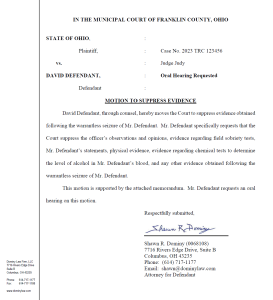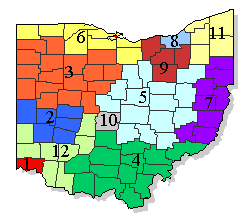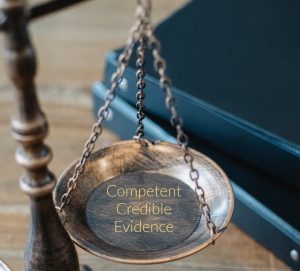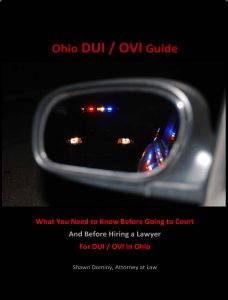 I recently came across this article in an Ohio newspaper: Judge Denies Motion to Suppress Evidence. What does that mean in a DUI case (called ‘OVI’ in Ohio)? When a judge orders that evidence is suppressed, the evidence is excluded from trial. That means, even though the evidence existed, the jury does not hear about it. The two general bases for suppressing evidence are: (1) violations of the defendant’s Constitutional rights; and (2) the government’s failure to comply with statutory (legislative) law.
I recently came across this article in an Ohio newspaper: Judge Denies Motion to Suppress Evidence. What does that mean in a DUI case (called ‘OVI’ in Ohio)? When a judge orders that evidence is suppressed, the evidence is excluded from trial. That means, even though the evidence existed, the jury does not hear about it. The two general bases for suppressing evidence are: (1) violations of the defendant’s Constitutional rights; and (2) the government’s failure to comply with statutory (legislative) law.
Articles Posted in DUI/OVI Constitutional issues
Ohio Supreme Court: Forfeiture of $31,000 Vehicle for DUI/OVI Not Excessive
 Back in 1791, when the 8th Constitutional Amendment was ratified, the Framers of the Constitution decided there should be limits on financial sanctions for criminal behavior. Accordingly, the 8th Amendment prohibits ‘excessive fines’. Courts have interpreted the Constitutional prohibition of excessive fines to apply to forfeiture of property in criminal cases. The Ohio Supreme Court recently held that forfeiture of a $31,000 vehicle for a repeat DUI conviction (called ‘OVI’ in Ohio) does not violate the Excessive Fines Clause of the 8th Amendment.
Back in 1791, when the 8th Constitutional Amendment was ratified, the Framers of the Constitution decided there should be limits on financial sanctions for criminal behavior. Accordingly, the 8th Amendment prohibits ‘excessive fines’. Courts have interpreted the Constitutional prohibition of excessive fines to apply to forfeiture of property in criminal cases. The Ohio Supreme Court recently held that forfeiture of a $31,000 vehicle for a repeat DUI conviction (called ‘OVI’ in Ohio) does not violate the Excessive Fines Clause of the 8th Amendment.
Nate Hobbs’ Case and Detentions for DUI / OVI investigations
 Although it is starting to look like it, this is not a blog about NFL players charged with DUI (called ‘OVI’ in Ohio). Recent articles discussed the cases of Henry Ruggs III and Geno Smith because those cases illustrated legal concepts related to DUI/OVI. The last article, about Geno Smith’s arrest, addressed what evidence indicates a driver may be under the influence before a traffic stop. In some DUI/OVI cases, traffic stops are not an issue, such as when the driver is in an accident or found passed-out behind the wheel. The legal concept at issue in those cases is when the driver is ‘seized’ and whether the seizure is legal. The case of Las Vegas Raiders cornerback Nate Hobbs illustrates that concept.
Although it is starting to look like it, this is not a blog about NFL players charged with DUI (called ‘OVI’ in Ohio). Recent articles discussed the cases of Henry Ruggs III and Geno Smith because those cases illustrated legal concepts related to DUI/OVI. The last article, about Geno Smith’s arrest, addressed what evidence indicates a driver may be under the influence before a traffic stop. In some DUI/OVI cases, traffic stops are not an issue, such as when the driver is in an accident or found passed-out behind the wheel. The legal concept at issue in those cases is when the driver is ‘seized’ and whether the seizure is legal. The case of Las Vegas Raiders cornerback Nate Hobbs illustrates that concept.
Geno Smith’s Case and Pre-Stop Evidence of DUI / OVI
 I heard a report that Geno Smith, quarterback for the Seattle Seahawks, was stopped for speeding and arrested on suspicion of DUI (called ‘OVI’ in Ohio). My first thought was, “speeding doesn’t sound like evidence of DUI”. It turns out Smith was allegedly going 96 mph in a 60 mph zone and driving erratically across several lanes of traffic (according to ESPN). That sounds more like evidence of DUI. Geno Smith’s case prompts the question: “what evidence, before a stop, indicates a driver may be under the influence?”
I heard a report that Geno Smith, quarterback for the Seattle Seahawks, was stopped for speeding and arrested on suspicion of DUI (called ‘OVI’ in Ohio). My first thought was, “speeding doesn’t sound like evidence of DUI”. It turns out Smith was allegedly going 96 mph in a 60 mph zone and driving erratically across several lanes of traffic (according to ESPN). That sounds more like evidence of DUI. Geno Smith’s case prompts the question: “what evidence, before a stop, indicates a driver may be under the influence?”
Does Ohio’s Drugged Driving ‘Per Se’ Law Unconstitutionally Punish Status?
 When a person uses marijuana, the high from the THC last for about two hours, but the THC metabolites are detectable in the person’s urine for up to five weeks. Suppose a person smokes marijuana and a week later is pulled over and investigated for DUI (called ‘OVI’ in Ohio). If that person submits a urine sample and the urine test shows a prohibited level of marijuana metabolite, that person will be prosecuted for OVI because it is ‘per se’ illegal to operate a vehicle with a prohibited concentration of marijuana metabolites, even if the person’s driving is not impaired. Challenges to this ‘per se’ OVI law have been unsuccessful in Ohio courts. A recent case from the Ohio Supreme Court suggests the Court may be inclined to evaluate the constitutionality of the OVI ‘per se’ law for drugs.
When a person uses marijuana, the high from the THC last for about two hours, but the THC metabolites are detectable in the person’s urine for up to five weeks. Suppose a person smokes marijuana and a week later is pulled over and investigated for DUI (called ‘OVI’ in Ohio). If that person submits a urine sample and the urine test shows a prohibited level of marijuana metabolite, that person will be prosecuted for OVI because it is ‘per se’ illegal to operate a vehicle with a prohibited concentration of marijuana metabolites, even if the person’s driving is not impaired. Challenges to this ‘per se’ OVI law have been unsuccessful in Ohio courts. A recent case from the Ohio Supreme Court suggests the Court may be inclined to evaluate the constitutionality of the OVI ‘per se’ law for drugs.
A Tale of Two Cities: Destroyed Evidence in Ohio DUI / OVI Cases
 In a DUI case (called ‘OVI’ in Ohio), what happens when evidence is destroyed because a prosecutor does not timely respond to a specific request for that evidence? It depends on the jurisdiction. In ten of Ohio’s 12 appellate districts, the case would likely be dismissed. In the other two Ohio appellate districts, there would likely be no sanction. Two appellate cases from two Ohio cities illustrate the outcome depends, in large part, on where the case is heard.
In a DUI case (called ‘OVI’ in Ohio), what happens when evidence is destroyed because a prosecutor does not timely respond to a specific request for that evidence? It depends on the jurisdiction. In ten of Ohio’s 12 appellate districts, the case would likely be dismissed. In the other two Ohio appellate districts, there would likely be no sanction. Two appellate cases from two Ohio cities illustrate the outcome depends, in large part, on where the case is heard.
Ohio Supreme Court Upholds OVI/DUI Stop Based on Shouted Tip
 There are many different ways somebody can find themselves as the subject of an OVI/DUI investigation. The most common is when an officer witnesses a driver commit a traffic offense, initiates a traffic stop, and then conducts an investigation based on their observations of the driver. Other times, an officer will conduct the traffic stop after receiving a tip from someone that a particular driver may be impaired. How precise do these tips need to be to justify a traffic stop? How much corroborating evidence does an officer need to corroborate the tip? The Ohio Supreme Court recently weighed in on these questions in State v. Tidwell.
There are many different ways somebody can find themselves as the subject of an OVI/DUI investigation. The most common is when an officer witnesses a driver commit a traffic offense, initiates a traffic stop, and then conducts an investigation based on their observations of the driver. Other times, an officer will conduct the traffic stop after receiving a tip from someone that a particular driver may be impaired. How precise do these tips need to be to justify a traffic stop? How much corroborating evidence does an officer need to corroborate the tip? The Ohio Supreme Court recently weighed in on these questions in State v. Tidwell.
Ohio DUI /OVI Cases and Competent, Credible Evidence
 When a defendant appeals a DUI conviction (called ‘OVI’ in Ohio), the defendant often claims the judge made an erroneous ruling regarding a motion to suppress. The appellate court then reviews the suppression issue decided by the judge to determine whether the judge’s decision was erroneous. When the issue involves a ‘finding of fact’ by the judge, the appellate court evaluates whether the finding was supported by competent, credible evidence. Two recent Ohio cases illustrate this appellate evaluation with opposite outcomes. Continue Reading
When a defendant appeals a DUI conviction (called ‘OVI’ in Ohio), the defendant often claims the judge made an erroneous ruling regarding a motion to suppress. The appellate court then reviews the suppression issue decided by the judge to determine whether the judge’s decision was erroneous. When the issue involves a ‘finding of fact’ by the judge, the appellate court evaluates whether the finding was supported by competent, credible evidence. Two recent Ohio cases illustrate this appellate evaluation with opposite outcomes. Continue Reading
Qualified Immunity: Yesterday, Today, and Tomorrow
 Qualified Immunity, a defense used by police officers in civil rights lawsuits, is a topic not typically discussed in this blog. However, as a criminal defense lawyer, I have been asked about Qualified Immunity due to recent events in the United States. In addition, an individual who files a lawsuit based on a false OVI arrest may encounter this defense. Accordingly, I have asked attorney Eric Hollway to provide a guest article on Qualified Immunity. Mr. Holloway, a civil rights lawyer who represents clients in false arrest claims, prepared the remainder of this article.
Qualified Immunity, a defense used by police officers in civil rights lawsuits, is a topic not typically discussed in this blog. However, as a criminal defense lawyer, I have been asked about Qualified Immunity due to recent events in the United States. In addition, an individual who files a lawsuit based on a false OVI arrest may encounter this defense. Accordingly, I have asked attorney Eric Hollway to provide a guest article on Qualified Immunity. Mr. Holloway, a civil rights lawyer who represents clients in false arrest claims, prepared the remainder of this article.
New Book For Those Charged With DUI / OVI: The “Ohio DUI/OVI Guide”
 Many people charged with DUI (called ‘OVI’ in Ohio), especially those charged with a first offense, feel like they are in the dark. They do not understand the elements and consequences of OVI, and they do not know what to expect in the court process. They also are uncertain about whether to hire a lawyer and how to find a good defense attorney. I recently published a new book, the Ohio DUI/OVI Guide, which answers most of the questions people ask in this situation. My hope is that those who read the guide will no longer be in the dark.
Many people charged with DUI (called ‘OVI’ in Ohio), especially those charged with a first offense, feel like they are in the dark. They do not understand the elements and consequences of OVI, and they do not know what to expect in the court process. They also are uncertain about whether to hire a lawyer and how to find a good defense attorney. I recently published a new book, the Ohio DUI/OVI Guide, which answers most of the questions people ask in this situation. My hope is that those who read the guide will no longer be in the dark.
 Columbus OVI/DUI Attorney Blog
Columbus OVI/DUI Attorney Blog

